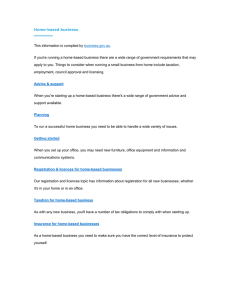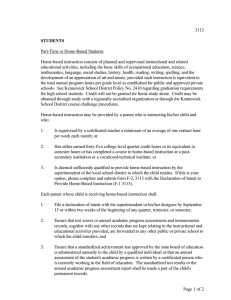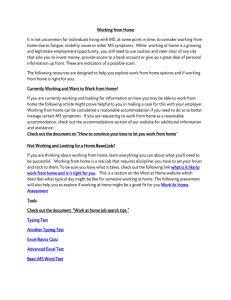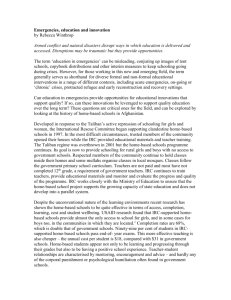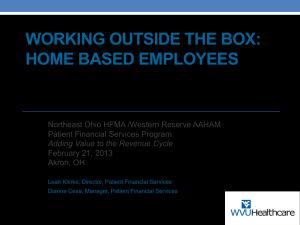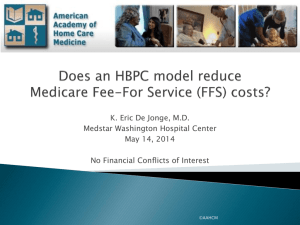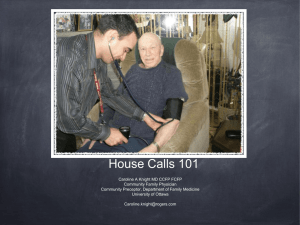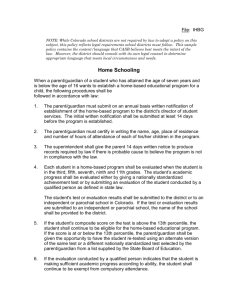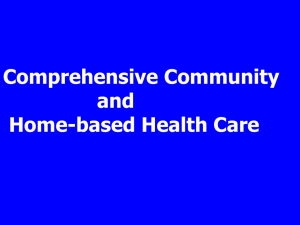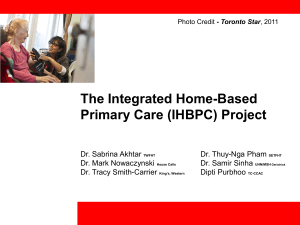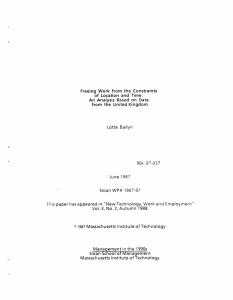The Importance of Home-based Primary Care: Why Older Adults
advertisement
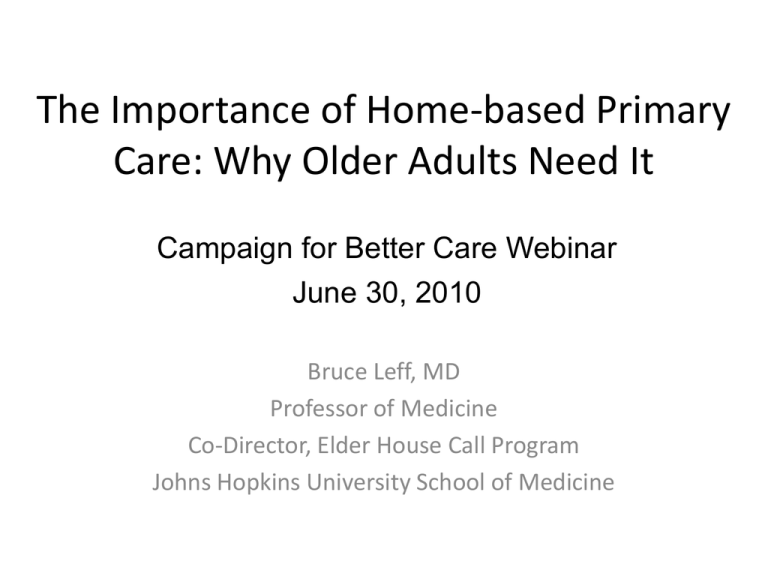
The Importance of Home-based Primary Care: Why Older Adults Need It Campaign for Better Care Webinar June 30, 2010 Bruce Leff, MD Professor of Medicine Co-Director, Elder House Call Program Johns Hopkins University School of Medicine Let’s Start with Leo • • • • Frail, homebound, 89 years old Limited mobility; walks with walker Needs help with activities of daily living Heart failure, lung disease, arthritis, diabetes, hypertension, etc • Admitted 4 times to the hospital last year for heart failure • Many medicines prescribed by physicians who have not seen him in years • Lives with frail wife who is his caregiver The Population is Aging and Increasingly Frail % of Older Adults Who Need Daily Personal Care • There are ~ 2-3 million older adults with high grade functional impairment • Will double in about 15 years Our Current System Doesn’t Meet Leo’s Needs • He can’t get to the office • Uses 911 as primary care, goes to the emergency department and is admitted to the hospital repeatedly • Treated as a basket of chronic conditions rather than a person with chronic conditions • No continuity of care • No attention to his quality of life Our Health Care System is Fiscally Unwell and Unsustainable Chronic Conditions and Medicare Expenditures Number of Chronic Conditions 0 Percent of Beneficiaries 65+ 18 Percent Medicare Expenditures 1 1 19 4 2 21 11 3 18 18 4 12 21 5 6 7 3 18 13 7+ 2 22% 14 66% Home-Based Primary Care Key Principles of Effective Home-Based Primary Care Practices 1. Compassionate, mobile primary care team providing primary and acute care 2. Target the most ill older adults, focus on providing high quality geriatric care and preventing hospitalizations 3. State-of-the-art diagnosis and treatment in the home 4. Coordinate ALL medical and social services 5. Financially viable for providers and for society Key Elements of the Home-Based Primary Care Model Acute, ER, Ambulance Subspecialists Radiology Patient Transportation, Labs MD/NP/SW 24/7 Team Portable HER Pharmacy, Durable Medical Equipment, IV, Oxygen Aides, Food, Environment, Legal Counsel, Housing Rehab, HHA, Hospice Additional Advantages of Home-based Primary Care • Provides access to health care and focuses on unique needs of older adults • “High touch, high tech” - portable technology expands clinical repertoire of home based physician compared to clinic • Seeing the patient in his / her own environment - builds trust, improves diagnosis, develop better care plans • House call physicians coordinate services and care better • Better integration of caregivers into care plans Outcomes of Home-Based Primary Care Program Outcome Veterans Affairs Home-Based Primary Care ↓ Total health care costs 24% Highest pt satisfaction any VA program -83% Virginia Commonwealth University ↓ Hospital costs 60% Urban Medical Housecalls, Boston ↓ Hospital admissions 29% ↓ Hospital days 34% University of Pennsylvania ↓ Total health care costs 50% ↓ Hospitalizations 64% Philadelphia House Call Program for posthospital patients ↓ Hospital readmissions 50% ↓ Total health care costs $3,000 to $4,845 per pt Elder Partnership for All Inclusive Care (ElderPAC) at Penn ↓ Medicare hospital days 59% ↓ Medicare care costs 50% Office Without Walls, Nevada ↓ Hospitalizations 27% ↓ Costs by $760 per patient Indianapolis House Call program ↓ Hospitalization 44% for high risk patients with multiple chronic diseases Summary • Population is aging and increasingly frail • The current health care delivery system doesn’t meet the needs of older, frail patients and is very expensive • Home-based primary care can deliver high quality care and reduce health service utilization and costs
